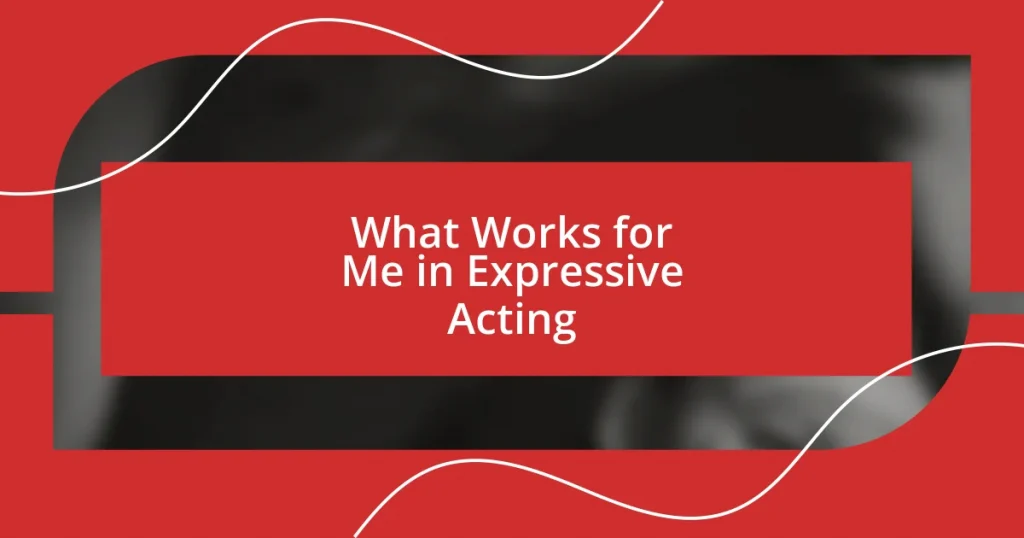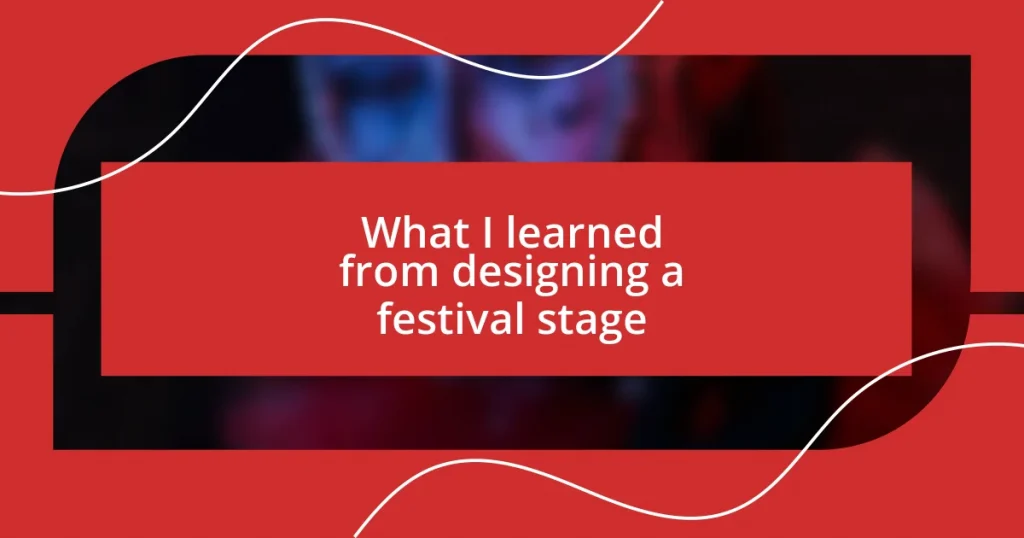Key takeaways:
- Expressive acting relies on authenticity and emotional vulnerability, creating a powerful connection between actor and audience.
- Key techniques include improvisation, emotional recall, and physical movement, which enhance performance by building genuine emotional experiences.
- Daily practice and reflection, such as recording performances and experimenting with emotions, are vital for developing skills and deepening character portrayal.
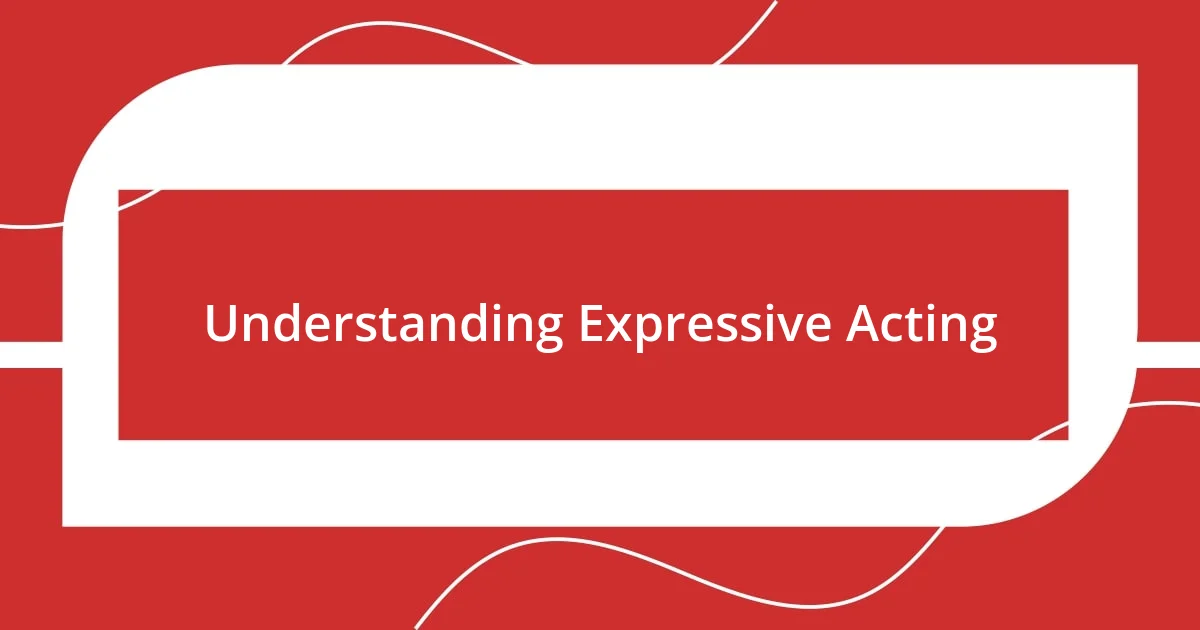
Understanding Expressive Acting
Expressive acting is all about tapping into your emotions and relaying them in a way that resonates deeply with the audience. I remember a time during a rehearsal when I hesitated to show vulnerability; it felt uncomfortable, yet I realized that this rawness is what draws the audience in. How can we connect with others if we don’t dare to unveil our true selves?
In expressive acting, authenticity is paramount. I often think back to my first performance, where I let go of my insecurities and allowed my character’s pain to flow through me. The applause that followed wasn’t just for a scripted delivery; it was for the honesty that permeated my portrayal. Isn’t it fascinating how sharing our authentic emotions can create a shared experience, bridging the gap between actor and spectator?
Understanding expressive acting also means recognizing the power of physicality. I’ve found that when I incorporate my body into the emotional landscape of a scene, it elevates the performance tremendously. Do you remember a moment in a movie where a simple gesture conveyed deep sorrow? That’s the beauty of expressive acting—it’s a dynamic interplay of mind, body, and spirit that makes storytelling come alive.
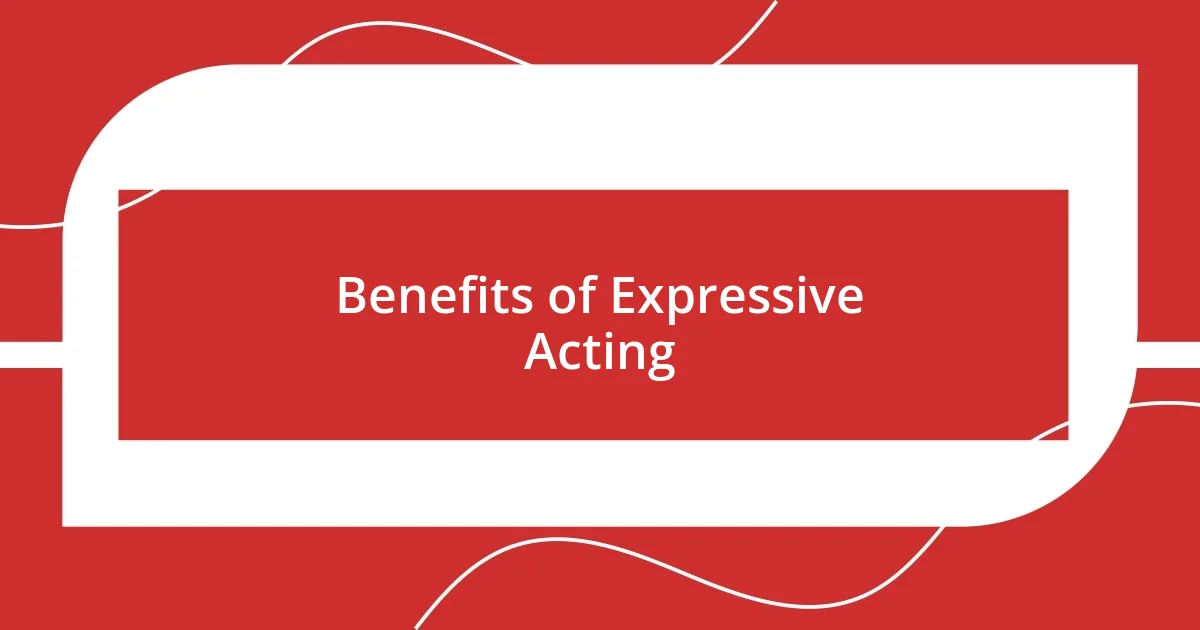
Benefits of Expressive Acting
Exploring the benefits of expressive acting reveals a rich tapestry of personal growth and emotional release. When I first embraced this style, I discovered the empowerment that comes from channeling genuine feelings. It transformed not only my acting but also how I interact with people in my everyday life. Instead of hiding behind a façade, I learned to welcome vulnerability, which has fostered deeper connections with others.
Here are some key benefits of expressive acting:
- Enhanced Emotional Awareness: I’ve become more in tune with my own emotions, allowing me to understand and express feelings more clearly.
- Improved Communication Skills: Expressive acting has honed my ability to convey ideas and emotions effectively, whether on stage or in casual conversation.
- Increased Confidence: Each performance has built my self-esteem, making me more comfortable in my own skin.
- Therapeutic Release: The process serves as an emotional outlet, relieving stress and promoting mental well-being.
- Stronger Empathy: By stepping into different characters, I’ve gained a broader perspective on human experience, deepening my compassion for others.
Each of these benefits intertwines, enhancing not just my craft as an actor, but my overall approach to life, giving me tools to navigate my personal and professional relationships with more grace and authenticity.
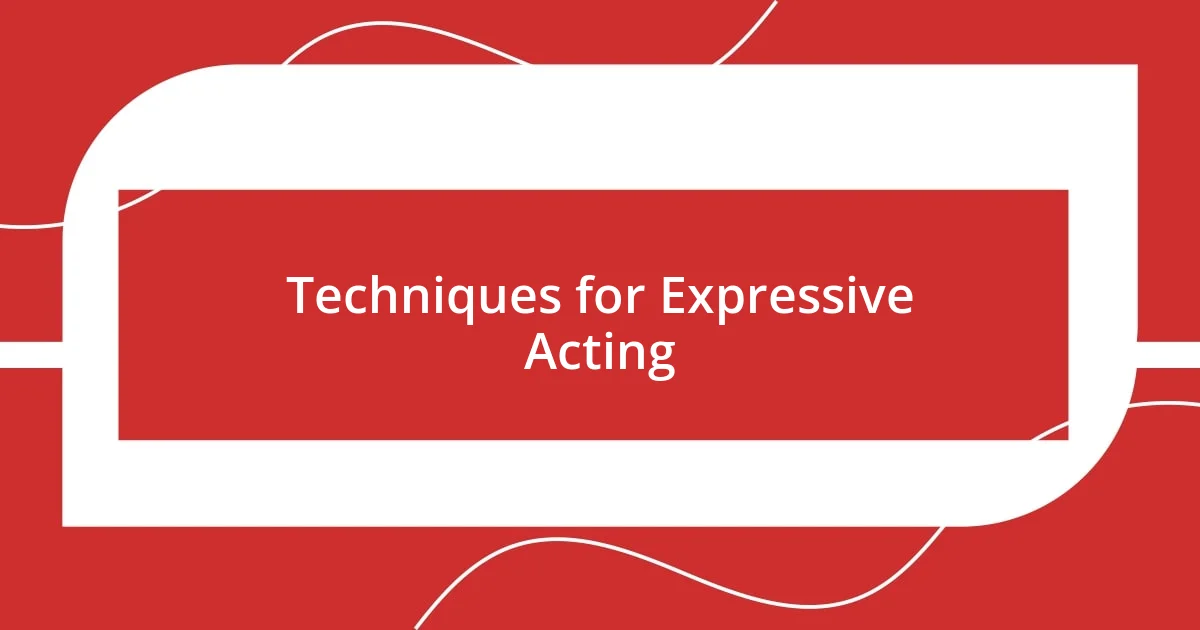
Techniques for Expressive Acting
Techniques for expressive acting vary widely, but there are a few that consistently resonate with me. One technique I find invaluable is improvisation. I remember a workshop where we were thrown into completely unscripted scenarios. The adrenaline rush of creating emotional moments on the spot taught me to trust my instincts. It’s a great way to embrace spontaneity and push the boundaries of your comfort zone. Ask yourself—when was the last time you truly let go and acted without a script?
Another approach that’s shaped my expressive journey is emotional recall. This method compels me to draw on personal experiences to convey genuine emotion. I recall preparing for a scene where my character was facing loss. Instead of mimicking sadness, I reflected on my own experience losing a dear friend. That deep dive into my past not only enhanced my performance but forged a deeper connection with the audience. It’s incredible how accessing real emotions can elevate a performance beyond mere acting.
Lastly, physical movement plays a vital role in expressive acting. I often analyze how my character’s emotional state influences their body language. There was a time I had to portray a character in despair; slumped shoulders and slow movements spoke volumes about that pain. I started realizing that non-verbal cues can often communicate far more than words ever could. Isn’t it fascinating how a slight shift in posture can evoke profound feelings?
| Technique | Description |
|---|---|
| Improvisation | Engages spontaneity and creativity, pushing comfort limits. |
| Emotional Recall | Utilizes personal experiences to evoke genuine emotions. |
| Physical Movement | Incorporates body language to enhance emotional expression. |
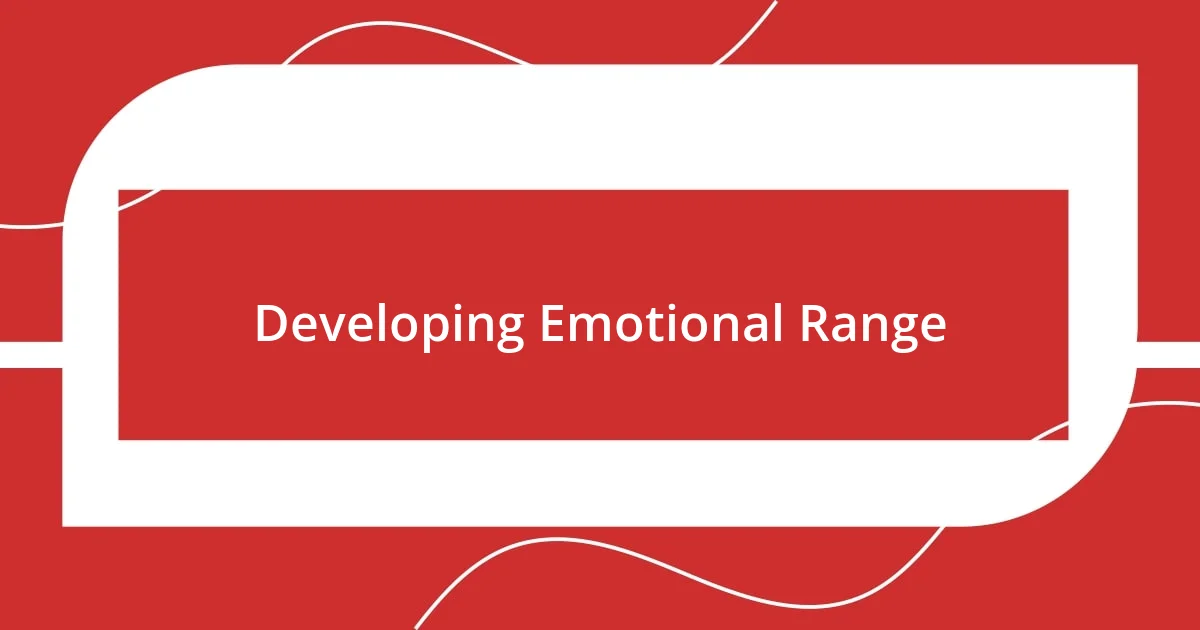
Developing Emotional Range
Developing emotional range in acting is a journey that continually challenges me. I recall a particular rehearsal where I was tasked with portraying a character filled with joy, yet I felt weighed down by my own concerns. In that moment, I learned the importance of opening myself up to the contrasting emotions that coexist within us. How often do we let our emotions clash, creating a more nuanced performance? Embracing this complexity allows me to tap into a wider emotional spectrum.
I often practice exercises that encourage vulnerability, like sharing personal stories in front of my peers. During one workout, I found myself recounting a moment of profound loss that surprisingly shifted my emotional landscape. As I spoke, I could feel the room’s energy change; we were all connected through that shared vulnerability. This experience taught me that emotional range isn’t simply about the extremes—it’s also about the subtle shifts that occur within our everyday lives.
Moreover, I have found that experimenting with different characters helps expand my emotional toolkit. I once played a role embodying a person battling inner demons, and it was difficult to tap into that darkness. However, that challenge led me to explore feelings I’d usually shy away from, reminding me that discomfort can lead to growth. What if we faced those uncomfortable feelings more often? I believe we would not only enrich our performances but also deepen our understanding of ourselves and the human experience.
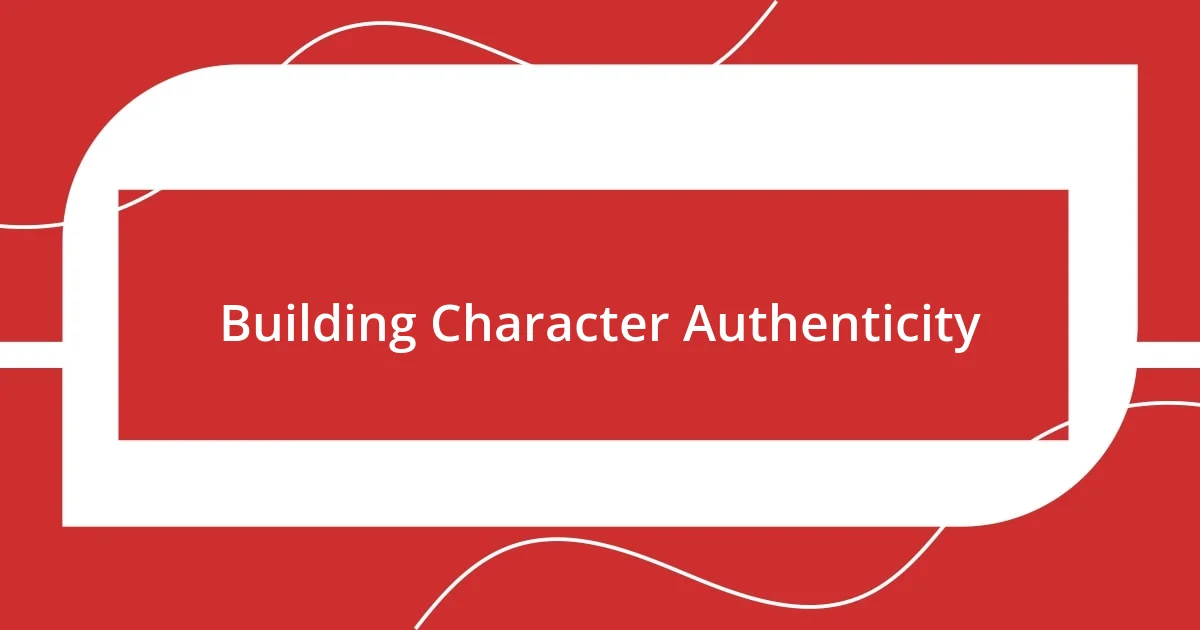
Building Character Authenticity
Building character authenticity hinges on the ability to fully embody the nuances of the persona you’re portraying. I often remind myself that a character isn’t just a collection of lines; they are a tapestry woven from experiences, desires, and emotions. I once prepared for a role of a single mother struggling with her circumstances, and I spent time with real mothers in similar situations. Their stories unveiled layers of resilience and vulnerability that I initially overlooked. Have you ever thought about how real-life experiences can inform and enrich your character choices?
Another powerful aspect I focus on is listening. Authenticity arises not just in what we say but also in how we respond to others on stage. I recall performing a scene where my partner’s emotional breakdown caught me off guard. Instead of sticking rigidly to my script, I allowed the moment to shape my response. The result? A raw, powerful exchange that felt true, not rehearsed. It’s worth asking: how often do we let spontaneity guide our interactions if we trust our instincts?
Additionally, I believe that embracing imperfections is essential in building authenticity. I remember a performance where I accidentally stumbled over a line. Instead of trying to cover it up, I acknowledged it with a laugh and continued. That little moment of humanity became a highlight of the show, allowing the audience to connect with me in a more genuine way. Isn’t it intriguing how our mistakes can sometimes lead to the most authentic moments? Embracing those flaws fosters a deeper connection between performer and audience, lending credibility and authenticity to our craft.
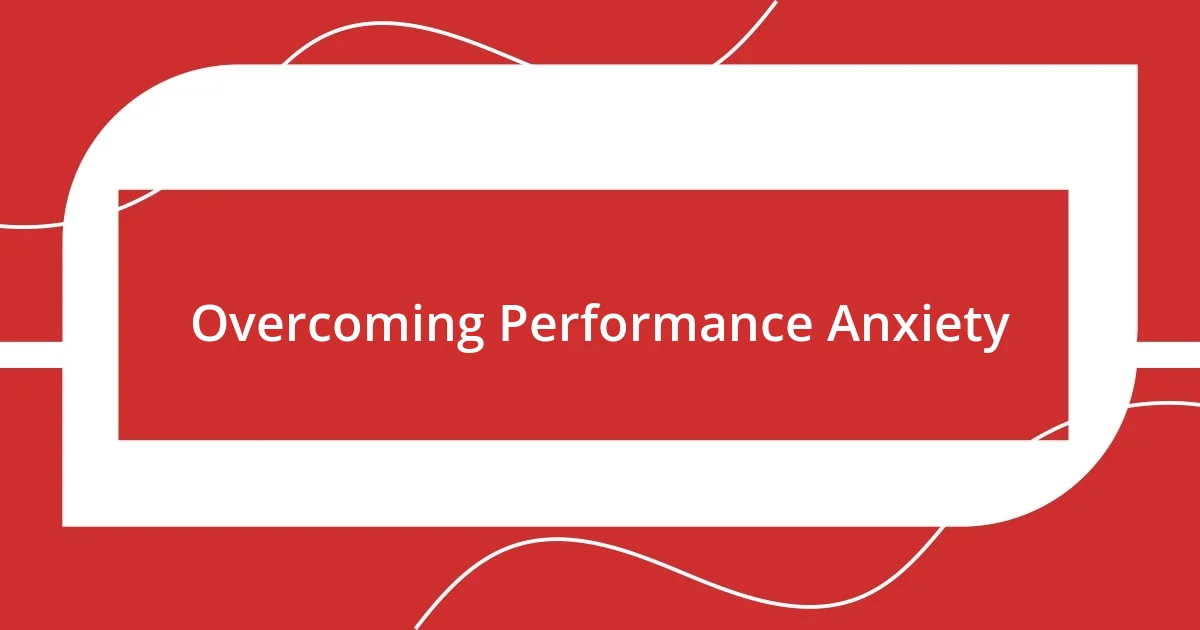
Overcoming Performance Anxiety
When facing the spotlight, my heart often raced, and my palms would sweat uncontrollably. I vividly remember my first big performance; I felt paralyzed by the fear of judgment. What helped me was the realization that this anxiety is a shared experience among performers. I began to see nerves not as a foe, but as an old friend reminding me that I genuinely care about my craft. Have you ever noticed how recognizing these feelings can soften their grip?
To combat performance anxiety, I’ve developed a set of grounding techniques that have become essential to my routine. For instance, before stepping onto the stage, I practice deep breathing exercises. I take a few moments to close my eyes and inhale deeply, visualizing my breath as a wave washing away my worries. This practice has transformed my pre-show jitters into a focused energy. Have you ever tried grounding yourself with simple breaths? It’s amazing how such a small change can create a ripple effect of calm.
Moreover, I’ve discovered the power of rehearsal in alleviating those anxious feelings. The more familiar I become with my lines and character, the less space there is for doubt. I often run my lines aloud in front of a mirror, not just to memorize them, but to connect with the emotions behind each moment. I recall a time when I had a particularly challenging scene, and through repetition, I found confidence blossoming within me. Do you think practice might also help dissolve some of your fears? Embracing preparation not only builds my skills but also transforms anxiety into excitement, turning a daunting experience into an exhilarating opportunity.
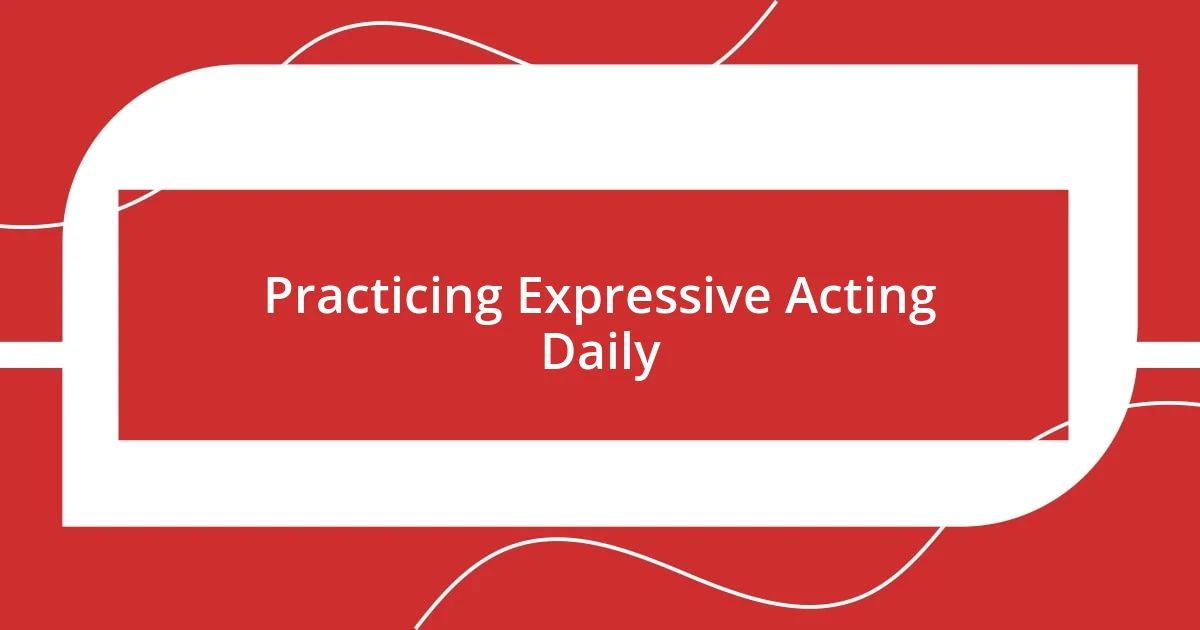
Practicing Expressive Acting Daily
Practicing expressive acting daily is something I consider crucial for honing my craft. I take a few minutes each day to connect with my emotions through improvisation exercises. One particular day, I spent an afternoon reflecting on the feeling of loss, embodying a character who had just experienced it. The raw emotions surprised me, revealing layers of depth that I hadn’t tapped into before. Have you ever felt how daily practice can unlock something profound within you?
Incorporating specific routines has also been essential for me. For instance, I designate time to read through scripts aloud, not just for memorization but to play with different emotional deliveries. This playful experimentation has often led to discovering unexpected moments that enhance my performance. I remember casually reading a scene, allowing emotions to flow freely, and suddenly finding a quirky yet poignant interpretation that made me giggle. Isn’t it exciting how regular practice can uncover unique facets of a character?
Moreover, I truly believe that recording myself is a game-changer. I often film short scenes or monologues to watch later, analyzing my body language and emotional expression. I was taken aback when I recorded a scene once, noticing how stiff I appeared despite my enthusiasm. Understanding this allowed me to rework my gestures and presence to feel more grounded. Have you ever reviewed your performances? It’s astonishing how seeing ourselves from a new perspective can catalyze growth and transformation.










